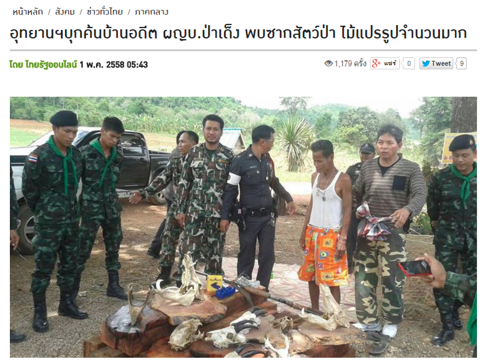
Academics rise against the draft amendments to Wildlife Reservation and Protection Act. Many sections from Act are prone to stimulate wildlife trading, possessing and hunting, while low fine is the only penalty.
Wildlife Reservation and Protection Act has been used for over 55 years and is now being dusted off as Wildlife Conservation Act to get in line with newly added sections. Unlike before, the new measures are now not meant to only preserve and protect wildlife but also to open the door to wildlife utilization.
In a seminar “Amending Forest and Wildlife Laws for whom?” organized by the Thai Society of Environmental Journalists and the Seub Nakhasathien Foundation at Thai Journalists Association, Academics criticized that wildlife utilization stated in the amendments is not on the right path towards conservation as wildlife trade is primarily supported.

Examples of the 2 New Sections Supporting Wildlife Trading, Possession and Hunting
1) Section 23
Anak Pattanavibool, a lecturer from Faculty of Forestry, Kasetsart University, was concerned about the Act which focuses more on wildlife trade. In “Chapter 2: Wildlife Trade”, there are 4 sections which mention trading in particular. Although this chapter promises to increase the number of wild animals in the wild by permitting legal breeding of wildlife, this is in contrast to the vision of international principles of wildlife conservation; breeding for sale will eventually lead to an increase of demand. Accordingly, hunting in the wild will also heighten due the demand and legal trade.
2) Section 57
Looking on the bright side, communities surrounding the forest will be allowed to live in the proposed zoning once proven. However, this section also states that residents are able to utilize natural resources under rules and sustainability and they are able to do some activities if allowed by the authority. Mr Anak saw that this would encourage more hunting because of unclear management and regulations. Moreover, this law might not even be practical.
An opening to animal hunting in the proposed zoning, as seen in Section 57, is a serious issue. It would bring wildlife hunting down to the same level as mushroom collection. For instant, a person would be capable of hunting a wild pig if permitted by the superintendent because a wild pig is not on the wildlife protection list.
In addition, he suggested a management method for communities within protected areas. The encroached lands, which were previously seized, should be allocated for utilization outside the forest.

Fine as Only Penalty
Many sections are likely to cause illegal actions themselves in the future, despite penalties. Section 63, for example, states that a person who has exploited wildlife to the level where damage occurs is to recover those resources or simply pay the penalty. Mr Anak mentioned that the penalty is not high enough to prevent a person from breaking the law because they could earn much more than they have to pay. In the worse case, if wildlife die or even become extinct, it would be difficult for the nature to return to how it used to be.
The remark above goes together with an opinion of Mr Khemthong Tonsakulrungruang from Faculty of Law, Chulalongkorn University, saying that an increase of fine is a must because traders’ earning is a lot higher than the cost of penalty. Furthermore, he also suggested that the calculation method could be integrated with marketing principles.
Article: “วิจารณ์หนัก! กฎหมายสัตว์ป่าใหม่ อนุญาตล่า-ครอบครอง-ซื้อขาย” reported by Kwanchanok Dejsane, Green News TV on May 7, 2015
Link: http://www.greennewstv.com/วิจารณ์หนัก-กฎหมายสัตว์/
Translated by: Wildlife Conservation Society (WCS) Thailand Program